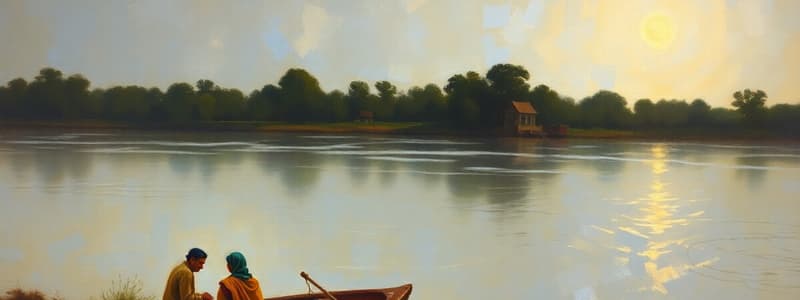Podcast
Questions and Answers
Which of the following dialects is NOT considered a regional variant of Bengali?
Which of the following dialects is NOT considered a regional variant of Bengali?
- Kolkata Bengali
- Maghi (correct)
- Sylheti
- Chittagongian
What significant event is commemorated on February 21 in relation to Bengali culture?
What significant event is commemorated on February 21 in relation to Bengali culture?
- Proclamation of Bengali as an official language
- Liberation Day
- Language Movement Day (correct)
- Bengali New Year
Which of the following figures is known for contributing significantly to Bengali literature and won a Nobel Prize?
Which of the following figures is known for contributing significantly to Bengali literature and won a Nobel Prize?
- Jibanananda Das
- Sharat Chandra Chattopadhyay
- Kazi Nazrul Islam
- Rabindranath Tagore (correct)
Which characteristic best describes the script used in the Bengali language?
Which characteristic best describes the script used in the Bengali language?
Which festival is celebrated predominantly in West Bengal as part of Bengali culture?
Which festival is celebrated predominantly in West Bengal as part of Bengali culture?
Which of these aspects does NOT pertain to the current status of the Bengali language?
Which of these aspects does NOT pertain to the current status of the Bengali language?
With approximately 230 million native speakers, where does Bengali rank among the most spoken languages in the world?
With approximately 230 million native speakers, where does Bengali rank among the most spoken languages in the world?
Which of the following statements about Bengali cuisine is true?
Which of the following statements about Bengali cuisine is true?
Flashcards are hidden until you start studying
Study Notes
Language and Script
- Bengali Language: An Indo-Aryan language primarily spoken in Bangladesh and the Indian state of West Bengal.
- Script: Written in the Bengali script, which is an abugida—a writing system where each character is based on a consonant with an inherent vowel.
Demographics
- Speakers: Approximately 230 million native speakers, making it one of the most spoken languages in the world.
- Regions: Predominantly in Bangladesh, West Bengal (India), and among the Bengali diaspora across the globe.
Dialects
- Standard Bengali: Based on the dialect spoken in the Kolkata (Calcutta) area.
- Regional Variants: Includes dialects such as Sylheti, Chittagongian, and others in Bangladesh, and various local dialects within West Bengal.
Literature
- Rich Literary Tradition: Home to a vast body of poetry, prose, and drama.
- Notable Figures: Rabindranath Tagore (Nobel laureate), Kazi Nazrul Islam, Sharat Chandra Chattopadhyay.
Culture
- Festivals: Pohela Boishakh (Bengali New Year), Durga Puja (celebrated predominantly in West Bengal).
- Cuisine: Famous for fish dishes, rice, and sweets like rasgulla and sandesh.
Historical Context
- Bengali Nationalism: Emerged in the 20th century as a movement against colonial rule and later against linguistic discrimination.
- Language Movement: The Bengali Language Movement of the 1950s in East Pakistan (now Bangladesh) sought recognition of Bengali as a state language, culminating in the Language Movement Day (February 21).
Current Status
- Official Status: Bengali is the official language of Bangladesh and one of the 22 scheduled languages of India.
- Global Presence: Significant Bengali-speaking communities in the UK, USA, Middle East, and other regions due to migration.
Education and Media
- Literacy Rate: Improving literacy rates in Bangladesh, with Bengali as the medium of instruction in schools.
- Media: Bengali newspapers, television channels, and online platforms contribute to contemporary culture and news dissemination.
Bengali Language: An Overview
- Bengali, an Indo-Aryan language, is primarily spoken in Bangladesh and the Indian state of West Bengal.
- It is written in the Bengali script, which is an abugida - a writing system where consonants have inherent vowels.
- With approximately 230 million native speakers, Bengali is one of the most spoken languages in the world.
- It is prevalent in Bangladesh, West Bengal, and among the Bengali diaspora globally.
Standard Bengali and Dialects
- Standard Bengali, based on the dialect in Kolkata (Calcutta), is the commonly recognized form of the language.
- Regional variants, including Sylheti, Chittagongian (in Bangladesh), and local dialects within West Bengal, add diversity to the language.
Literature and Culture
- Bengali literature boasts a wealth of poetry, prose, and drama, with renowned figures like Rabindranath Tagore (Nobel laureate), Kazi Nazrul Islam, and Sharat Chandra Chattopadhyay.
- Bengali culture is vibrant, with festivals like Pohela Boishakh (Bengali New Year) and Durga Puja (celebrated predominantly in West Bengal) playing a significant role.
- Bengali cuisine is renowned for its fish dishes, rice, and sweet treats such as rasgulla and sandesh.
History of Language and National Identity
- Bengali nationalism emerged in the 20th century, initially as a movement against colonial rule, and later against linguistic discrimination.
- The Bengali Language Movement in the 1950s in East Pakistan (now Bangladesh) championed the recognition of Bengali as a state language, leading to Language Movement Day (February 21).
Current Status and Global Presence
- Bengali is the official language of Bangladesh and one of the 22 scheduled languages of India, signifying its significance in both nations.
- Due to migration, there are substantial Bengali-speaking communities in the UK, USA, Middle East, and other regions, further spreading its global presence.
Education and Media
- Improving literacy rates in Bangladesh are driven by Bengali as the primary medium of instruction in schools.
- Bengali newspapers, television channels, and online platforms actively contribute to contemporary culture and news dissemination.
Studying That Suits You
Use AI to generate personalized quizzes and flashcards to suit your learning preferences.



